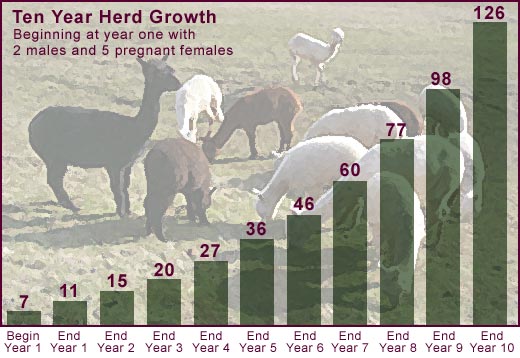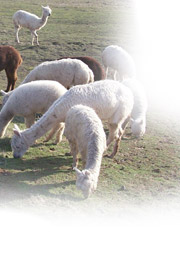Why Raise Alpacas?
Why do people in so many countries call Alpacas, "The world's finest livestock investment?" For any investment to be valuable, it must possess certain qualities, which make it desirable. Gold is scarce, real estate provides shelter, oil produces energy, bonds earn interest, stocks are supposed to increase in value and diamonds symbolize love. Alpacas share many of these investment attributes.
Around the world Alpacas are in strong demand and people pay high prices for them. They are scarce, unique, and the textiles produced from their fiber are known in the fashion centers of Paris, Milan and Tokyo. There are excellent profit opportunities and tax advantages to Alpaca breeders and investors. Historically, the Alpaca's value has sustained ancient cultures, such as the Incas of Peru, and today Alpacas are the sustaining economic force for millions of South Americans. History has validated the value of the Alpaca.
"Livestock," or animals raised for profit, was an investment long before financial stocks were sold on the New York Stock Exchange. The richest families of ancient times counted their wealth by the size of their flocks of sheep or herds of cattle.
Today, wealth as a result of livestock ownership is not as common, but tending to a graceful herd of Alpacas can also be an exciting way to earn a substantial cash flow and live a rewarding lifestyle.
Alpaca breeders enjoy nurturing their animals every bit as much as receiving the profits they provide. The man who created the "Beefmaster" cattle from imported Limousine stock made the following observation: "I know a lot of doctors and lawyers who would like to be cowboys, but I don't know any cowboys who would trade places with them."
Since 1984 Alpacas have appeared, almost simultaneously, in several countries where they had never been seen before. The U.S., Canada, New Zealand, France, Australia and England have all acquired the foundation animals for national herds. What makes this animal so desirable? Bottom line: Alpacas are both profitable and enjoyable.
Where to start
First, determine your goal for Alpaca ownership. Would you like to own an inexpensive pair of gelding males for fiber production or as pets for you and your family? As a 4-H project for your children? Are you going to be a full time or part-time breeder? Will you invest in Alpacas for current financial returns or are you going to build a herd toward the day you retire?

Data from Alpaca Owners and Breeders Association
Once you've decided on your goal, the path to Alpaca ownership will be more easily defined. Maybe you've decided to start a small herd and let it grow over a period of time before retiring and living off the income the herd produces. If so, you'll have the power of compounding on your side. Remember, our first graph demonstrated that five females and two males would grow to 126 Alpacas in ten years. Thirty-five of these would be adult females and they would produce about 28 cria in year ten. Sales from this many babies at today's prices would generate about a quarter million dollars in annual sales. The next year, your sales would be even larger since an additional 15 females would be old enough to breed.
If you're interested In acquiring a producing Alpaca herd with immediate sales, you may want to consider a larger initial investment. You would probably invest in a number of pregnant females who would deliver a cash crop of cria immediately. This larger Investment might also encourage you to become more involved in the industry and spend more time marketing your herd. Some breeders with bigger herds have full time ranch managers or hire additional labor to assist them with the day-to-day chores.
However you choose to be involved, there is an opportunity. The industry is very young and represents a ground floor opportunity. Very few investments have the potential to reproduce themselves every year. An Alpaca does. Today's smaller breeder can choose to be almost any size In the future. An investor, who likes the return Alpacas offer, or the lifestyle they provide, can choose any level of investment.
Contact us regarding investments in Alpacas and we will be glad to answer any questions you might have.
About us | About
Alpacas | Why Raise Alpacas? | Animals
For Sale | Stud Services | Visit Us
Alpaca Home | Bed & Breakfast | Alpaca
FAQ |
Our Baby Pictures | Alpaca
Links
Laughing Gargoyle Alpacas
26126 NW Russell Creek Rd. • Gaston,
OR 97119
Phone: 503-662-3016 • Fax: 503-662-4274
email: info@laughing-gargoyle.com
www.laughing-gargoyle.com

